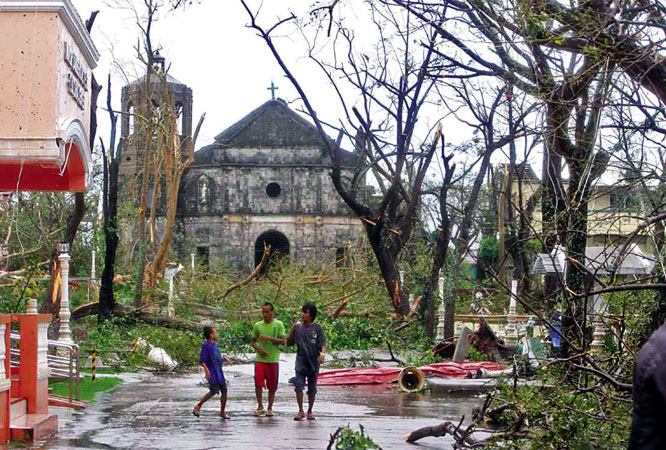
WHILE the rest of the town is a scene of massive devastation after Supertyphoon “Yolanda,” a church in Daanbantayan, a town in northern Cebu, appears to have survived the storm. TONEE DESPOJO/CEBU DAILY NEWS
CEBU CITY—Up to 2,000 children in Daanbantayan, a town in northern Cebu province that was also devastated by Super Typhoon “Yolanda,” are getting free meals in a program to keep them attending classes even in tents, but officials have realized that feeding the children is not enough.
A two-day conference organized by the United Nations’ Children’s Fund (Unicef) in this city became an eye-opener for local government officials currently grappling with nutrition concerns after Yolanda destroyed sources of livelihood and forced hundreds of thousands of people to rely on aid.
Mayor Augustus Corro, of Daanbantayan, said he learned during the conference that feeding alone was not enough to keep children healthy.
Unicef gathered 36 mayors from towns worst-hit by Yolanda to help them address the needs of children, considered to be the most vulnerable when calamities strike.
“We focus on four areas—water and sanitation, child protection, health and nutrition, and education,” said Zafrin Chowdhury, Unicef chief for communications and private fund raising.
At the conference, mayors were briefed about the national government’s Reconstruction Assistance on Yolanda (RAY) and Unicef’s Strategic Response Plan (SRP).
The mayors, who attended the conference, came from the towns of Alangalang, Tanawan, Lapaz, MacArthur, Dulag and Jaro in Leyte and Bantayan and Daanbantayan in Cebu. At least 40 mayors had been invited to the conference but four failed to make it because of bad weather.
At the end of the conference, the mayors signed a memorandum of understanding with Unicef to become partners in efforts to protect and promote the welfare of children especially during and after calamities.
Chowdhury said Unicef programs were in support of the government’s reconstruction efforts.
Angela Kearney, also a representative of Unicef, said the UN agency would visit towns to determine from the children themselves what they need most.
Chowdhury said Unicef funds would be allotted based on this survey of the children on the ground.
Initially, Chowdhury said Unicef was sending school supplies, bags and teaching materials to 40 towns to help bring the children back to school.
Teachers would be given training on how to cope with disasters to enable them to continue fulfilling their tasks during and after disasters, according to Kearney.
“We have to teach them resilience because whether we like it or not there will be other disasters,” she said.
Chowdhury said Unicef would also help give jobs to families who have lost their means to feed their children.
“Our focus is on children but also on families because we cannot isolate families from the children,” Chowdhury said.
“If the family’s food intake needs to improve, we have to look at their livelihood,” Chowdhury said.
“The well-being of the family determines if the child goes to school,” Chowdhury added.